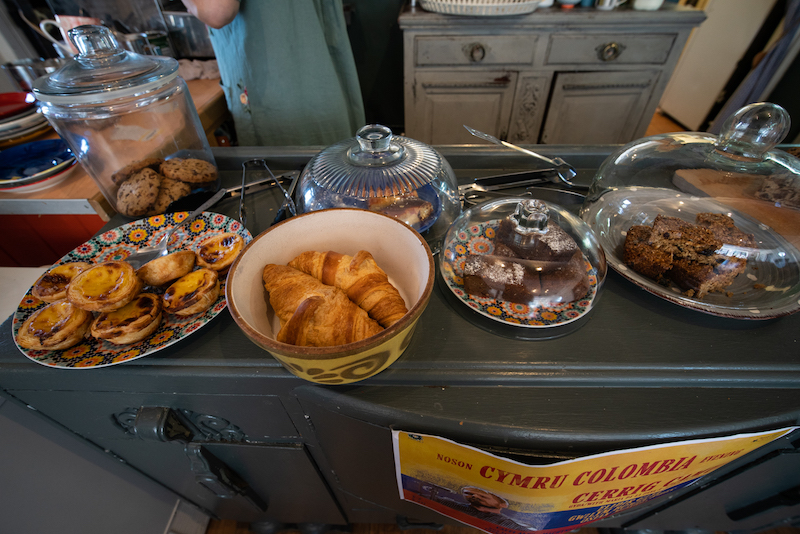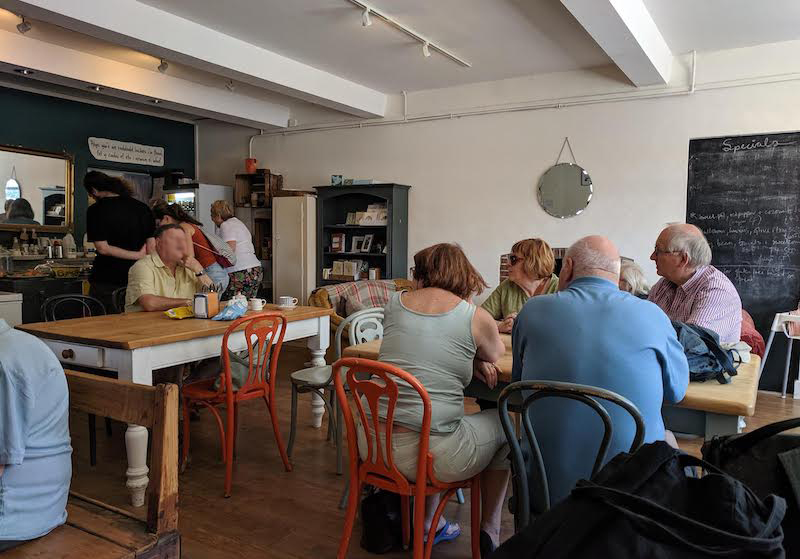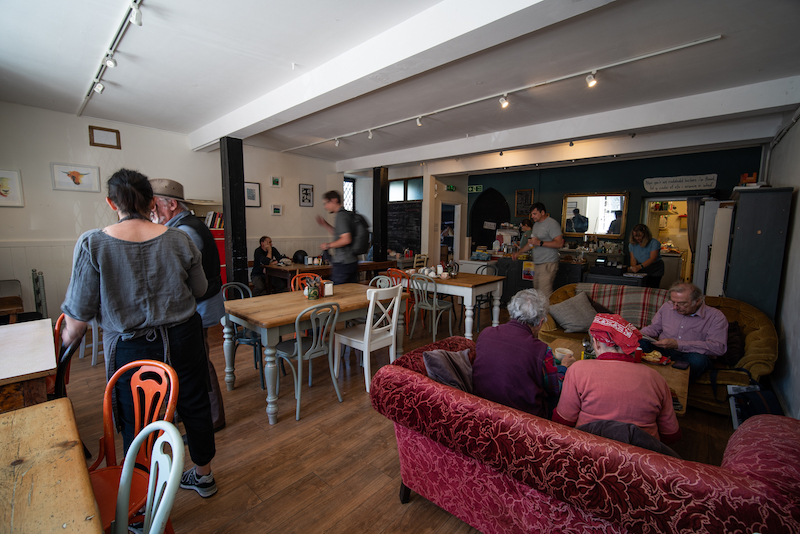One of the best places you can practise your Welsh and increase your confidence is at your local café, especially if customers are encouraged to order in Welsh.
In this article, we’ve included the most common Welsh phrases you will hear when ordering, paying and receiving your food at the table.
Ordering at the counter

The most polite way of ordering food at the counter in Welsh is by using the phrase:
Ga i [ frechdan caws ] os gwelwch yn dda?
May I have [ a cheese sandwich ] please?
Ca i is the future tense of cael (to have). It mutates from Ca i to Ga i because you are asking a question and causes the following noun to soft-mutate (e.g. brechdan becomes frechdan).
Note that many native Welsh speakers use the word plîs instead of os gwelwch yn dda so feel free to follow their example.
Ga i [ frechdan caws ] plîs?
May I have a [ cheese sandwich ] please?
Two colloquial variations on this question are:
Alla i gael [ brechdan caws ] plîs?
Can I have [ a cheese sandwich ] please?
This first variation literally translates as “can I have” because the future tense of gallu (to be able to / can) is combined with cael (to have).
Ga i gael [ brechdan caws ] plîs?
May I have [ a cheese sandwich ] please?
In the second example, you are repeating the verb cael twice: once in the future tense and once in its infinitive form.
Note: Neither of these variations is as accepted as ga i on its own but that doesn’t mean you won’t hear them in conversation.
If you happen to know the server very well, you can simply state what you want, followed by plîs.
[ Brechdan caws ], plîs!
[ A cheese sandwich ], please!
Some other phrases you might use at the counter include:
[ Coffi ] i fynd plîs.
[ A coffee ] to go please.
Gymera i un o’r rheina.
I’ll take one of those.
The standard response to any question containing ga i is either cei or cewch (yes, you may). Cei is informal whereas cewch is formal, so you will be more likely to hear the latter in a café if you don’t know the server.
Ga i un o’r rhain plîs? – Cewch.
May I have one of these please? – Yes, you may.
Because cewch can sound a little stiff on its own, some servers may prefer to respond with expressions such as wrth gwrs (of course) or dim problem (no problem), or they might tack the word siŵr (sure) onto the end of cewch to make it sound a bit more friendly.
If the café prepares a wider range of food than what is available at the counter, you can always ask to see a menu, which is bwydlen in Welsh. Once again, you can use the expression ga i to make the request:
Ga i weld y fwydlen, plîs?
May I see the menu, please?
Paying for your food
You’ve ordered your food and now it’s time to pay. If you want to ask how much something is, you can use the following expressions:
Faint ydy o?
How much is it?
Faint ydyn nhw?
How much are they?
In Welsh, the word for pound is punt whereas the word for penny is ceiniog. Notice how punt and ceiniog mutate after certain numbers between 1 and 10:
Un bunt – £1
Dwy bunt – £2
Tair punt – £3
Pedair punt – £4
Pum punt – £5
Chwe phunt – £6
Saith punt – £7
Wyth punt – £8
Naw punt – £9
Deg punt – £10
Un geiniog – 1p
Dwy geiniog – 2p
Tair ceiniog – 3p
Pedair ceiniog – 4p
Pum ceiniog – 5p
Chwe cheiniog – 6p
Saith ceiniog – 7p
Wyth ceiniog – 8p
Naw ceiniog – 9p
Deg ceiniog – 10p
After ten, you can choose to either continue with the punt (pound) / ceiniog (penny) pattern or switch over to the o bunnoedd (of pounds) / o geiniogau (of pennies) pattern. For example:
tri deg saith ceiniog – OR – tri deg saith o geiniogau
37 pence
naw deg naw punt – OR – naw deg naw o bunnoedd
99 pounds
Pum punt a deg ceiniog, os gwelwch yn dda.
Five pounds and ten pence, please.
Note: If you can’t remember the numbers, don’t panic – many Welsh speakers use English numbers when paying for goods.
Sometimes you may find that you don’t have any cash (arian parod) handy, in which case you will definitely want to ask one of the following questions:
Dych chi’n derbyn cardiau credyd / debyd?
Do you accept credit / debit cards?
Ga i dalu gyda cherdyn credyd / debyd?
May I pay with a credit / debit card?
To the first question, the server will respond with either ydyn (yes, we do) or nac ydyn (no, we don’t). To the second, the response will be either cewch (yes, you can) or na chewch (no, you cannot).
At the table

If your food is taking a while to arrive, you can ask the following question:
Esgusodwch fi, pryd fydd y bwyd yn barod?
Excuse me, when will the food be ready?
When your food finally does arrive, the server will probably say dyna ni (which means here we are) as they put the plate on the table. Then they may ask if you want any sauces or condiments:
Dach chi eisiau [ sos coch ]?
Do you want [ ketchup ]?
To this you can reply with oes / nac oes in the north or ydw / nac ydw in the south.
Thanking your server
At the end of any of these interactions, you can use the phrases diolch (thanks) or diolch yn fawr (iawn) (thank you very much) to thank the server. A little politeness goes a long way! 😉
Dyma eich bwyd. – Diolch yn fawr.
Here is your food. – Thank you very much.
Things you might order in a café

- paned o goffi = a cup of coffee
- mwg o de = a mug of tea
- sgon = scone
- bara brith = “bara brith” fruit loaf
- cacen / teisen = cake
- cacen de = teacake
- brechdan = sandwich
- cawl = soup
- tarten sawrus = quiche
- browni = brownie

